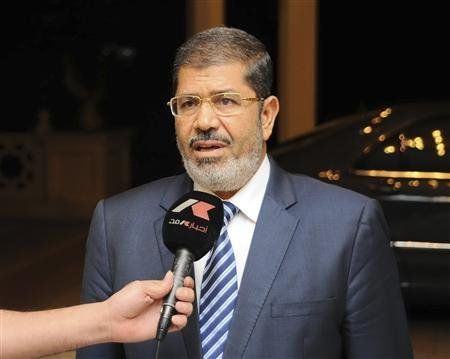 Ousted Egyptian leader Mohamed Morsy struck a defiant tone on the first day of his trial on Monday, chanting "Down with military rule," and calling himself the country's only "legitimate" president.
Ousted Egyptian leader Mohamed Morsy struck a defiant tone on the first day of his trial on Monday, chanting "Down with military rule," and calling himself the country's only "legitimate" president.
Morsy, an Islamist who was toppled by the army in July after mass protests against him, appeared angry and interrupted the session repeatedly, prompting a judge to adjourn the case.
Opponents of Egypt's army-backed government say the trial is part of a campaign to crush Morsy's Muslim Brotherhood movement and revive a police state.
It is the second time in just over two years that an overthrown president has been in court in Egypt, a nation said by government critics to have reverted to authoritarian rule.
The trial is not being aired on state television and journalists were barred from bringing their telephones into the courtroom set up in a Cairo police academy.
Morsy, dressed in a blue suit and held in a cage, made a Brotherhood hand gesture to express his disgust at a crackdown on a protest camp that was razed by security forces in August.
"This trial is illegitimate," said Morsy, prompting the judge to adjourn the session. Proceedings are expected to resume later on Monday.
The now-banned Muslim Brotherhood has said it will not abandon the street protests it has staged to pressure the army to reinstate him.
But a heavy security presence across the country served as a reminder of a crackdown in which hundreds of Morsy supporters were killed and thousands more rounded up.
UNCERTAINTY
The uprising that toppled Hosni Mubarak in 2011 had raised hopes that Egypt would embrace democracy and human rights and eventually enjoy economic prosperity.
Instead, the power struggle between the Brotherhood and the army-backed government has created more uncertainty in the U.S.-allied country of 85 million, which has a peace treaty with Israel and controls the Suez Canal, a vital global trade route.
The trial of Morsy is likely to be the next flashpoint in their confrontation, which has hammered tourism and investment.
He and 14 other Islamists face charges of inciting violence relating to the deaths of about a dozen people in clashes outside the presidential palace in December after Morsy enraged his opponents with a decree expanding his powers.
The defendants could face a life sentence or the death penalty if found guilty.
Morsy travelled to the heavily guarded courthouse from an undisclosed location by helicopter, state media said. The trial is taking place in the same venue where Mubarak has also been facing trial for complicity in killing protesters.
Hundreds of Morsy supporters gathered outside the building to pledge their support for him. One sign read "The will of the people has been raped," a reference to the army takeover.
Tahrir Square, where Egyptian protesters had gathered during the uprising against Mubarak, and later Morsy, was sealed off by army personnel carriers and barbed wire.
Traffic was light in the usually bustling Cairo, suggesting many stayed home for fear of violence.
The Brotherhood had won every election since Mubarak's fall and eventually propelled Morsy into power after the Islamist movement endured repression under one dictator after another.
But millions of Egyptians who grew disillusioned with Morsy's troubled one-year rule took to the streets this summer to demand his resignation. They accused Morsy of usurping power and mismanaging the economy, allegations he denied.
"We didn't see as much misery in the 30 years of Mubarak as much as we saw in one year of Morsy," said Ali, a driver who was sipping morning tea at a cafe in downtown Cairo.
"He fooled us with his year in power. I feel a huge burden is being lifted today."
The army, saying it was responding to the will of the people, deposed Morsy and announced a political road map it said would lead to free and fair elections.
But the promises have not reassured Egypt's Western allies, who had hoped the military men's grip on power would be broken.
CALL FOR PROTESTS
The Brotherhood has called on its supporters to stage mass protests on Monday, but the size of their demonstrations has shrunk because of heavy policing.
Security forces have killed hundreds of Islamists and arrested thousands, including the Brotherhood's top leaders.
Army chief Abdel Fattah al-Sisi, who toppled Morsy, has become immensely popular. Few doubt his victory if he runs for president.
The Brotherhood maintains Mursi's removal was a coup that reversed the democratic gains made after Mubarak's overthrow.
"It is clear that the goal of this trial as well as any action against the Muslim Brotherhood is to wipe out the group as well as any Islamist movements from political life," said Mohamed Damaty, a volunteer defence lawyer for Mursi.
In the most senior visit to Cairo by a U.S. official since Morsy's fall, Secretary of State John Kerry also called for a fair, transparent trial for all Egyptians.
Egyptian officials admit the path to democracy has been rocky, but say a proper political transformation will take time.
Egypt has also faced a sharp escalation of attacks by Islamist militants in the Sinai Peninsula. Security forces are attacked almost daily.
Speaking to Reuters by phone, Osama Morsy, the deposed president's 30-year-old son, said his father had not authorized a defence lawyer and the family would not attend the trial. "We do not acknowledge the trial. We are proud of my father and feel strong about his position."



